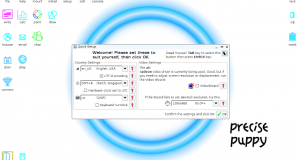Linux operating systems are free and open source. They work really well for the people who want to use a comparatively low priced OS in order to establish their network. Linux is used in most of the server networks. Linux was established to be used a secure OS which helps in supporting the working of even the major networks. More ...
Read More »Linux News
How to check a service is running or not in Linux?
Some times we need to check the status of a service if it is running or not to cross verify something on server. Suppose you have edited your httpd.conf file and when restarting the service it just show start service is on. But when you try to get access to the web site the site is down. At that time we ...
Read More »Basic Introduction of Puppy
Puppy is designed to run from a USB pen drive or from DVD. It is not designed to be installed to the hard drive although it can be. The approach taken by Puppy is about minimalism where functionality trumps pretty graphics. All the usual favourites can be installed including FireFox and VLC but there are a host of lightweight alternatives ...
Read More »Basic Introduction of Mageia?
10 years ago the Linux landscape looked a lot different to how it looks today. Ubuntu was still in development. At that time there were other Linux operating systems leading the way including Mandrake (Mandriva), openSUSE and PCLinuxOS. Mageia was originally a fork of the Mandriva codebase and it is a community driven distribution targeting the same sort of ...
Read More »Basic Introduction of Linux Mint ?
Linux Mint is clearly one of the distributions that the readers of this blog should be checking out. The order of the day for Linux Mint is evolution over revolution and if you are looking for a traditional desktop oriented operating system with taskbars, system trays and menus then Linux Mint is definitely worth a go. Linux Mint is a ...
Read More »How to enable or disable services in Debian / Ubuntu
To Enable and disable services across runlevels in Debian, Ubuntu, and other Debian based Linux distributions we use a script called update-rc.d. How to enable a service As an example, to enable Apache web server in Debian, do the following – # update-rc.d apache2 defaults … this will enable the Apache web server to start in the default run levels ...
Read More »Red Hat / CentOS: Check / List Running Services
There are various ways and tools to find and list all running services under Fedora / RHEL / CentOS Linux systems. service command – list running services service --status-all service --status-all | grep ntpd service --status-all | less Print the status of any service To print the status of apache (httpd) service: service httpd status List all known ...
Read More »How to enable and disable services in Red Hat
Red Hat, Fedora, and Red Hat based Linux distributions such as CentOS make use of the script called chkconfig to enable and disable the system services running in Linux. How to enable a service As an example, lets enable the Apache web server to start in run levels 2, 3, and 5. This is how it is done. We first ...
Read More »Basic Introduction of PCLinuxOS
A definite must try for new users to Linux. It always surprises me that PCLinuxOS languishes lower down in the top 10 rather than sitting up in 2nd or 3rd. For new and inexperienced users, PCLinuxOS provides the closest experience to what they are probably used to than any of the aforementioned distributions (with the possible exception of Linux Mint). ...
Read More »Open Source India
Open Source India ASIA’S LEADING OPEN SOURCE CONVENTION on 21-22 October 2016 Starting at 10 AM Venue: NIMHANS Convention Center, Bengaluru India
Read More » Linux Delhi India Linux Users Group – Delhi
Linux Delhi India Linux Users Group – Delhi









